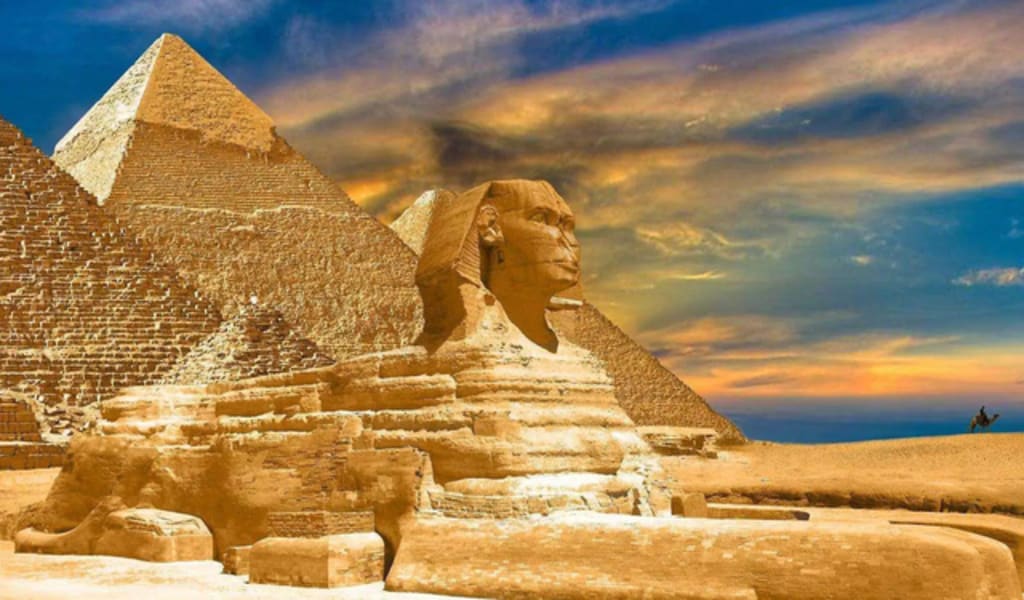Famous experiments of Egyptian pharaohs
The world's greatest inventions

Human language is almost the greatest invention in the world. Language has connected people's different ideas into shining stars of wisdom and has driven the history of human civilization.
Different languages exist in different regions, and there are currently about 5,671 different human languages in the world. The emergence of these languages is both a miracle in human history and an invaluable treasure.
Have you ever imagined how languages are born? How does a new language emerge? To study this problem, the Egyptian pharaohs made a famous experiment in which they gathered babies who had not yet learned the language to see if a new language would be born, and what was the result.
The Egyptian Pharaohs' "Baby Experiment"
In the northeast of Africa, there exists a very mysterious and ancient land, that is, Egypt. The Egyptians built their kingdom in the desert and gave birth to the ancient Egyptian civilization, which is the most shining and long-standing civilization in the history of human civilization.
Egyptian civilization is like a bright star hanging over the African continent, bringing the dawn of civilization to the African continent. Naturally, the pharaohs who ruled the Egyptian civilization were also very important in history, and during the endless years, they not only ordered the construction of the pyramids but also did some "strange" experiments.
The construction of civilization naturally requires language as a good "foundation", so in the land of Egypt, there also exists a unique "Egyptian language", the Egyptian language is also the ancient Egyptian pharaohs and people as a "priceless treasure The Egyptian language was regarded as a "priceless treasure" by the Pharaohs and their people.
To study the language, a pharaoh who ruled Egypt more than 2000 years ago made a strange "baby experiment". The pharaoh firmly believed that Egyptian was the greatest language in the world and that Egypt was the most developed country in the world. But to find out the secrets of the language, he launched an unprecedented experiment.
To conduct this experiment, it was necessary to find people who had never been exposed to the language. So Pharaoh thought of babies, Pharaoh ordered several newborn children isolated in the outside world, because the newborn children do not know the language, so in terms of language, several children are like "white paper", which fundamentally ensures the feasibility of the experiment.
In the isolated land, Pharaoh only arranged for a shepherd who could not speak to take care of the children, to cut off any opportunity for the infants to come into contact with the language. All things being equal, Pharaoh expected the children to invent a language comparable to Egyptian.
As the days went by, the babies began to grow up. At first, the babies did not even know they could vocalize because no one had taught them to do so. Only after growing up a bit, do these babies know how to communicate with babbling sounds.
But these sounds are chaotic and disorderly, not at all called language, more like a primitive way of communication. Even after growing up, these babies were not able to invent a whole new language, as Pharaoh had expected.
These babies still only use babbling sounds to communicate, sometimes even with some hand gestures, just like primitive people. Pharaoh's "baby experiment" failed.
How did language come about?
Since babies cannot be born with systematic language communication skills and cannot invent a new language, how did the first languages in human history come about?
Because of the difficulty of language research, the scientific community has not yet thoroughly studied the birth of language. With so many languages in the world, it is not possible to produce accurate results or to know how the world's first language was born.
There are, however, two prevailing hypotheses in the scientific community about how languages are born, and perhaps these two hypotheses can shed light on the mystery of language.
The first is the continuum hypothesis. Proponents of the continuum hypothesis believe that language did not emerge overnight and that it must have taken a long process to come into being. Therefore, the birth of our language must be inseparable from our ancestors.
As early as the primitive society period, our ancestors probably mastered a little bit of language, but due to the backwardness of society, the language was not as rich as it is now, people mostly still use body language to communicate.
With time, these initial languages slowly began to change and gradually evolved into the systematic languages we know today.
The second is the discontinuity hypothesis. Unlike the continuum hypothesis, scientists who support the discontinuity hypothesis believe that our language emerged suddenly from a certain period and did not exist from the beginning. To test this hypothesis, scientists have been searching for "historical objects" that prove the birth of language.
Whether in stone or clay, scientists have found records of ancient writing. However, since language is more likely to be older than writing, even if we find ancient writing, we cannot be sure that this is the source of language.
Therefore, it remains a mystery to us as to when language emerged in history.
Perhaps for mankind, the emergence of language is a gift from God. It is because of the birth of language that the wisdom of mankind has been able to communicate and converge. It is also because humans can communicate with each other that our civilization can continue to develop.
It can be said that without the birth of language, the development of human civilization would not have existed. There are millions of languages in the world, but no matter which language it is, it is a unique and priceless "treasure" in human history.
About the Creator
Karen Gillanah
The aggravation that can be told is not aggravation; the lover that can be snatched away is not a lover.






Comments
There are no comments for this story
Be the first to respond and start the conversation.